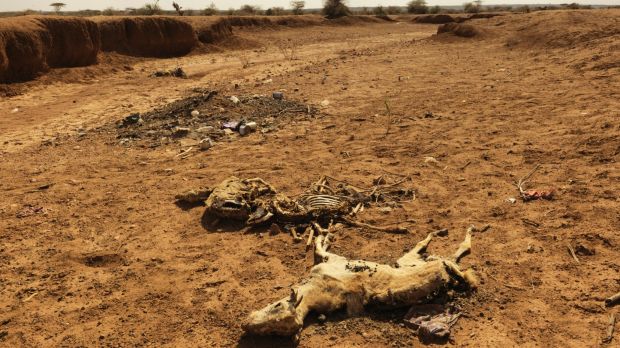"Africa made its own problems. Quit having 10 kids. Famine is nature's way of saying there are too many people. Stop reproducing."
More World News Videos
Caught between war and famine in South Sudan
Fleeing violence, those fortunate enough to reach a United Nations camp in Bentiu, South Sudan, remain caught between famine and war.
This comment by one Australian on social media attracted 23 likes. Even though the food crisis gripping East Africa is driven by civil war, drought and economic collapse - not overpopulation - it's a common refrain among Australians posting on social media and news site comment sections.
"Send them a box of condoms instead of any food. They only know how to breed nonstop and then beg for food," says another.

Famine is always happening in Africa anyway, right? The aid money never does any good - it just makes them dependent or goes to corrupt officials. We should look after our own. Besides, they're all Islamic countries anyway. They deserve it.
These are the ill-informed and sometimes ugly attitudes that permeate public commentary around the crisis, which is putting up to 23 million people at risk of starvation and has been described as the worst humanitarian disaster since World War II.
Local NGO Plan International Australia has performed an audit of the public's perception and attitudes of the disaster as the aid community grapples with why normally generous donors are not responding to this crisis the way they usually do.
It found that despite sympathetic mainstream media news reports on the crisis, the comments in response were consistently and pervasively negative.

Plan CEO Ian Wishart says most of these attitudes come from lazy stereotypes and a poor understanding of the situation - and occasionally also unkindness.
"We're currently responding to a very serious crisis in the eastern part of Africa that may rival the terrible 1983 Ethiopian famine in scale and severity, yet apathy and negativity about this emergency is widespread," Mr Wishart said.

"Plan is on the ground right now in South Sudan assisting thousands of children and their parents who are unwittingly caught up in this disaster, so we feel compelled to correct the record."
Plan's report, Challenging Negative Attitudes About the Food Crisis in East Africa, aims to bust eight of the most common myths.

One of the most pernicious is that Islam is to blame for the crisis. In fact, three of the four worst affected countries - South Sudan, Ethiopia and Kenya - are Christian majority countries. Yemen, on the nearby southern end of the Arabian peninsula, is the only predominantly Muslim nation among those hardest hit.
Polling conducted for aid agency Caritas last month found just 32 per cent of Australians were aware there was a major crisis unfolding in the region.
United Nations efforts to raise at least $4.4 billion in humanitarian aid from wealthy nations have fallen embarrassingly short as the world has remained preoccupied with Donald Trump, terrorism, political instability, Middle East turmoil and North Korea.
The Turnbull government - despite overseeing massive cuts to Australia's foreign aid program - has pledged $68 million towards the crisis.
MOST COMMON ATTITUDES TO EAST AFRICA FAMINE
1. Overpopulation is the cause of the famine.
2. Domestic issues are more important than providing aid to other countries.
3. The money never arrives to those who need it.
4. Famine is always happening in Africa.
5. People affected by famine deserve it.
6. Why give money when people in the developing world should simply help themselves?
7. Providing humanitarian aid indentures people into poverty.
8. Islam is to blame for the crisis.















